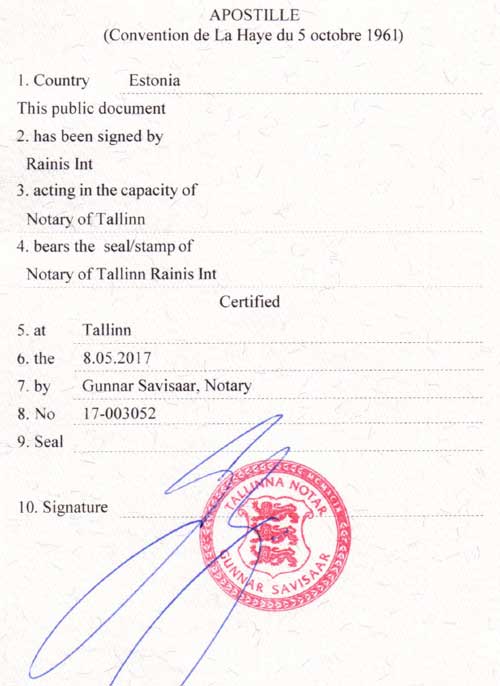
Schmidt & Schmidt компаниясы Эстон Республикасы аумағында берілген құжаттарды апостильдеу арқылы заңдастыру қызметтерін ұсынады.
Эстон Республикасы 1961 жылғы 5 қазан күнгі Гаага конвенциясына қатысушы болып табылады, ол құжаттарды апостильдеу арқылы жеңілдетілген заңдастыру рәсімін қарастырады. Эстон Республикасы 2000 жылғы 11 желтоқсанда Гаага конвенциясына қосылып, 2001 жылғы 30 қыркүйекте конвенция Эстонияда күшіне енді.
2009 жылғы 30 желтоқсанға дейін Эстонияда құжаттарды апостильдеу құқығын беретін уәкілетті органдар:
- Сертификаттар, дипломдар, аттестаттар, біліктілік куәліктері, Білім министрлігінің құжаттары – Эстония Білім және ғылым министрлігі;
- Азаматтық жағдайларды тіркеу органдарының құжаттары (туғаны туралы куәлік, өлім туралы куәлік, некеге тұру туралы куәлік, некелік құзырет туралы анықтамалар) және сот шешімдері – Эстония Әділет министрлігі;
- Жергілікті билік органдары мен ІІМ құжаттары – Эстония Ішкі істер министрлігі;
- Зейнетақы құжаттары, дәрігер сертификаттары, жұмыспен қамту құжаттары – Эстония Әлеуметтік істер министрлігі;
- Басқа ресми құжаттар – Эстония Сыртқы істер министрлігі.
2010 жылдан бастап Эстонияда қоғамдық құжаттарды апостильдеу құқығы нотариустарға берілді. Құжатты апостильдеу үшін нотариусқа жазбаша өтініш пен апостильденген құжат ұсынылуы қажет.
Эстон Республикасында берілген құжаттар, апостильденген және нотариалды аудармасы расталған жағдайда, Ресейде ресми құжаттармен тең заңдық күшке ие болады.
2015 жылғы 1 қаңтардан бастап эстон тілінен орыс тіліне апостильденген құжаттың аудармасын тек ант берілген аудармашы жасай алады. 2020 жылға дейін эстон нотариустары шетел тілінен эстон тіліне аудармаларды растау құқығын сақтады, 2020 жылдан бастап бұл құқық тек ант берілген аудармашыларға беріледі.
Апостиль ресми органдардан шыққан, эстон немесе ағылшын тілінде жасалған құжаттарға қойылуы мүмкін.
Эстон Республикасында құжаттарды апостильдеу процесі құжаттың шығу тегін тексеруді қамтиды және құжаттағы қолтаңба, мөр немесе штамп уәкілетті тұлғалармен қойылғанын растайды. Бұл рәсімнен кейін құжатқа арнайы мөр – апостиль қойылады. Апостиль әдетте құжаттың артқы бетінде немесе жеке парақта қойылады, содан кейін құжат тігіледі.
Эстон Республикасындағы апостиль төртбұрышты мөр болып табылады, жағының ұзындығы кемінде 9 см, эстон және ағылшын тілдерінде жасалады, «Apostille» тақырыбын және 1961 жылғы Гаага конвенциясына француз тіліндегі сілтемені (Convention de La Haye du 5 octobre 1961) қамтиды. Мөр мазмұны Гаага конвенциясымен белгіленеді.

Эстонияда апостиль қойылатын құжаттар
- Мемлекеттік органдар, өзін-өзі басқару органдары және лауазымды тұлғалар, соның ішінде прокурорлар, судьялар және сот орындаушылар шығарған құжаттар
- Эстония сауда реестрінен үзінділер
- Әкімшілік құжаттар
- Нотариалды актілер
- Жеке тұлғалар қол қойған ресми құжаттардың куәліктері
- Ресми құжаттардың нотариалды көшірмелері
1997 жылдан бастап берілген гимназия бітіру куәліктеріне апостиль қою үшін мемлекеттік емтихан куәлігін қоса тіркеу қажет. 2009 жылғы 15 маусымнан бастап мемлекеттік емтихан куәлігі электрондық түрде жасалады, нотариустар оны мемлекеттік порталдан басып шығара алады.
Кеден, дипломатиялық, консулдық құжаттар мен паспорттарға апостиль қойылмайды.
1941–1992 жылдар аралығында берілген азаматтық жағдай куәліктері Эстонияда апостильдеуге жарамсыз деп саналады.
Апостильдің әрекет ету мерзімі шектелмеген, бірақ құжаттардың өз мерзіміне шектеулер қойылуы мүмкін.
Апостиль мен консулдық заңдастыру арасындағы айырмашылықтар
Апостиль мен консулдық заңдастырудың ортақ белгісі – олар ресми құжаттың басқа елдің мекемелерінде қолданылуы үшін шынайылығын растайды. Алайда олардың арасында елеулі айырмашылықтар бар.
| Апостиль | Консулдық заңдастыру | |
|---|---|---|
| Шындық | Тек Гаага конвенциясына қатысушы елдер арасында ғана қолданылуы мүмкін. | Гаага конвенциясына қатыспайтын немесе қатысушы еместігінен бір немесе екі ел арасында, немесе бір тарап екінші тараптың қосылуына қарсы болған жағдайда қолданылады. |
| Алу қиындығы | Орташа. Апостиль алу үшін құжат берілген елдің уәкілетті органыға жүгіну қажет. | Жоғары. Консулдық заңдастыру үшін құжат берілген елдің әртүрлі органдарына және консулдықтарға жүгіну қажет |
| Алдын ала растау | Қажет емес. | Қажет. Құжатты берген органнан алдын ала растау қажет. |
| Мақсат елінің консулдығында заңдастыру | Мақсат елінің консулдығына жүгіну қажет емес. | Заңдастырудың соңғы кезеңі әдетте құжат берілген елде мақсат елінің консулдығында өтеді. |
Эстониядан құжаттарды талап ету
Кейде азаматтық жағдайға қатысты құжаттар жоғалып кетуі немесе бүлінуі мүмкін, немесе құжаттардың өзекті көшірмелерін алу қажет болады. Мұндай жағдайда құжаттардың дубликаттарын талап ету қажет. Эстониядан кеткен адамдар көбіне осы процедурада қиындықтарға тап болады. Біздің сервис Эстониядан құжаттарды қашықтан талап етуге мүмкіндік береді және құжаттарды әлемнің кез келген нүктесіне курьер арқылы жеткізе алады.
Құжаттарды нотариалды аудару
Көбіне мемлекеттік органдар тек мемлекеттік тілде жасалған құжаттарды қабылдайды. Сондықтан апостильмен расталған және шетел тілінде берілген құжаттарды қолдану үшін олардың аудармасын жасау және аударманы нотариалды куәландыру қажет. Біздің сервис арқылы құжаттарды ағылшын тілінен қазақ немесе орыс тіліне нотариалды аударуға тапсырыс беруге болады.
Аударма апостильмен расталуы керек пе?
Бір елде берілген және басқа елде қолдану қажет кез келген шетелдік құжат легализациялануы тиіс. Эстонияда апостиль қойылған құжатты орыс тіліне аудару оның әлі де шетелдік құжат мәртебесінде болатынын білдіреді, және оған апостиль қойылуы қажет. Сондықтан көптеген органдар Эстониядан расталған аудармаларды қабылдамауы мүмкін. Бұдан аулақ болу үшін аудармаларды құжатты қолданатын елде жасау ұсынылады.
























































